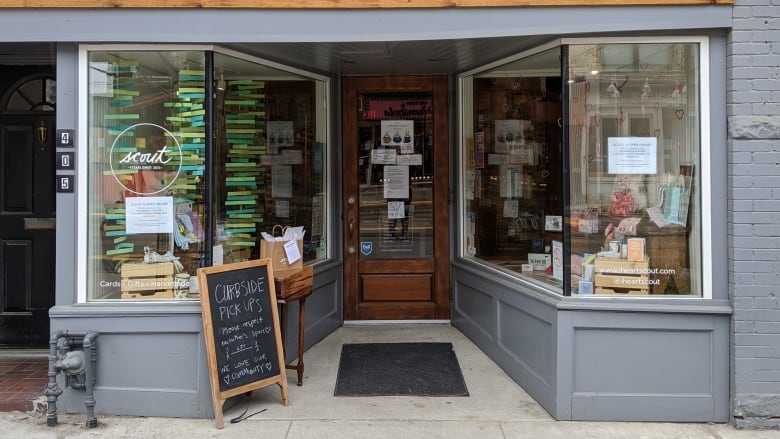How local businesses are adapting as curbside pickup begins in Ontario
Some stores welcome the service, others say it's not feasible

Like almost all local business owners, Leah Eyles has adapted to online sales to keep her business afloat, after closing her brick and mortar stores. With curbside pickup beginning today in Ontario, she'll have to adjust again.
"We just kind of go with the flow and make it work as we need to," said Eyles, who owns Scout, a gift shop with two locations in Toronto.
Curbside pickup for retail stores with street fronts begins Monday after the province permitted nurseries and garden centres to fully open on Friday, followed by hardware and safety supply stores on Saturday.

Eyles said her gift shop has seen a 30 per cent decline in sales since the pandemic. She's had to let four of her six employees go, but still considers herself one of the fortunate ones — she was able to pay her full May rent at both locations and said her online sales are "thriving."
Since closing her shops in early March, Eyles has focused on Scout's online store and has worked to be innovative in an effort to keep sales up. She's been offering shipping discounts and porch delivery. She's also selling popular pandemic products like puzzles and is writing personalized messages for customers in greeting cards and mailing them out.
She's stopped offering porch delivery as of today and has moved strictly to curbside pickup, which she said is easier and safer because she no longer has to enter apartments or condos.

"We have hand sanitizer and gloves and I feel like we've kind of set ourselves up already for curbside pickup to be a more consistent way of doing business," she said.
Eyles has already been offering some curbside pickup orders after making the option available in the week and a half leading up to Mother's Day.
In order to keep employees and customers safe, she's only allowing one employee in the store at a time, and payment must be done prior to pickup. The products are placed in a bin, pickup is contact-less, and hours are limited.
Eyles said curbside pickup has presented some issues so far, including the expectation that customers can pick up products instantly as well as the challenge of only communicating with people online.
But, she said, business owners will continue to adapt.
"It's just a lot to figure out and it's the hardest time to be a business owner," she said.
Pickup not feasible for all businesses
The co-owner of Coal Miner's Daughter, a clothing and accessories store with four locations in Toronto, said curbside pickup doesn't make financial sense for the company.
Krysten Caddy said the stores' locations are too spread out and it's impossible with only two people running the business — a new reality after they had to lay off all 10 staff members.
"We just don't have the manpower to sustain that business model right now," Caddy said.
While online sales are doing better than expected, Caddy said it's not enough to hire staff back to run curbside pickup. She said the online store is making just enough to pay half of the rent at all four locations, a rate their landlords are charging while they wait to see if they're eligible for the federal government's commercial rent relief program.
"We don't even really have enough to pay our rent, we're not paying ourselves and we didn't have enough for our staff at the end of the day," Caddy said. "There's really no good way to find the right balance in [curbside pickup]."
She also said some staff members don't feel comfortable going back to work at this point. She and the other owner are instead continuing to focus on online sales and preparing for when businesses get the green light to open fully, at which point staff will likely all come back to work.

For now, they're working with a local seamstress to make masks for staff, purchasing plexiglass shields and planning how to best enforce physical distancing rules inside the stores.
"We'll make sure that we're following all the rules very closely so that our staff feel comfortable and our customers feel comfortable," she said.
Benefits of reopening outweigh consequences, prof says
The vice-president of research and innovation at the University of Toronto's Dalla Lana School of Public Health said the government's timing to begin reopening, including curbside pickup, is appropriate.
"They're taking a very careful and phased approach," Vivek Goel said.
Goel, who is also a professor at the school, said from a health, economic and social perspective, society cannot stay inside for much longer.
"It's a balancing act," he said. "What are the consequences of continuing as we are [compared to] the consequences of COVID-19? I think that is the explanation that we have to start to give to the population."

Goel said the lockdown measures put in place were appropriate at the time to slow community spread of COVID-19 and avoid overwhelming hospitals, which Goel said worked.
"Now we have to rebalance the messaging and get people to accept that it is OK to go out," he said, adding that it's only feasible if physical distancing rules are respected.
Goel said as more businesses get permission to open, the government must give clear guidance on what's expected from a health and safety standpoint.
"They're going to need to be prepared for enhanced hygiene measures, the use of personal protective equipment when required," he said. "They need to get supplies, so it's a very careful approach."
And as more people go outside, Goel said elderly and immunocompromised people must be protected and that adequate COVID-19 testing is available. He said it's important people don't forget simple, yet effective advice: wash your hands, don't touch your face and maintain a safe distance from others.


